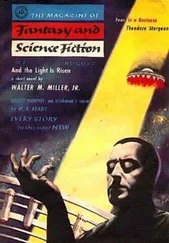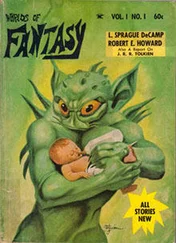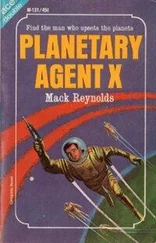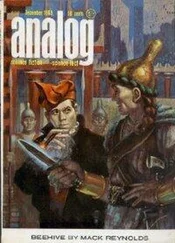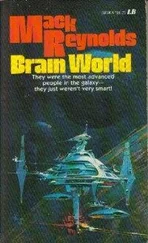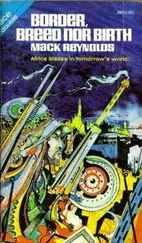Ability Quotient
Mack Reynolds
Bert Alshuler said, “The one thing I learned in the army that was worth learning was never to volunteer.”
Professor Katz did his rueful smile. “I was in Korea,” he said. “It seems a long time ago, and, of course, it was.” It would have been difficult to put your finger on the professor’s age; he might have been in his early sixties, his late seventies. His hair was gray, rather than white, and he was vitally alert.
The younger man didn’t respond to the smile. “Then you should know.”
Leonard Katz shifted in his chair, leaned forward and touched the tips of his fingers together. He said, “It’s not exactly a matter of volunteering… ah… Alshuler. You were selected.”
“By whom?”
“By the computers of the National Data Banks.”
“Why me?”
“Remember the tests you took, immediately before release from the military?”
“How in the hell could I forget? They must have taken at least two weeks. Why, I couldn’t figure. We were getting out of the army, not in. It was just two more weeks of typical army snafu.”
“They were compiling your Ability Quotient,” the professor told him.
“Never heard of it.”
“Very few have. At this stage of the game, we who are on the project are keeping it minimized.”
Bert Alshuler recrossed his legs. He was beginning to become intrigued. “Kay,” he said. “Tell me about the Ability Quotient tests. Something like I.Q.?”
“It goes far beyond I.Q.” The professor made with his rueful smile again. “You see, the I.Q. tests were early in the game. They were the infancy of the tests of today. They didn’t and couldn’t measure all-round intelligence. There is no such thing. But they were a beginning. Today we still utilize an upgraded form of the I.Q. tests but we also test for verbal ability, verbal fluency, numerical ability, spatial ability, perceptual ability, memory, speed of reflexes, accident proneness, digital dexterity, analogizing power, mechanical aptitude, clerical aptitude, emotional maturity, veracity, tone discrimination, taste sensitivity, even natural charm, color blindness, accuracy, persistence, drive, neurosis, powers of observation, health and a few others.”
“Don’t I know it?” Alshuler remarked. “Like I said, it took two weeks to get through them all. Some were pretty silly. Anyway, and…?”
“And you came out on top.”
Alshuler scowled at him. “You mean of all the people in the country?”
Professor Katz shook his head. “No, of course not. All the people in the United States of the Americas have not been given the tests. However, most of those in your age group being released from the military and particularly those who were single and about to enter college have been. For one thing, we were in a position to give such persons our tests without arousing much interest in our project. The military is endlessly giving examinations and tests.”
“And …?”
The professor leaned back in his chair again and looked at the younger man thoughtfully, as though wondering whether or not to go on. He obviously wasn’t completely happy at the other’s attitude.
He said finally, “We want you to enter into an experiment which will continue throughout the period you attend this university.”
“I figured on working toward a doctorate, seven or eight years.”
“It won’t take you seven or eight years.”
Bert Alshuler looked at him. “Why not?”
The professor said, “That’s part of the experiment.”
“Kay. We’ve finally got to the point. What experiment?”
Leonard Katz said, “My dear Alshuler, we want you to leave the selection of all your courses in the hands of the computers.”
The younger man’s face was blank. “How do you mean?”
“We want them to decide what you will study, at what pace you will go, whose lectures you assimilate, that sort of thing—for the whole period of your work here.”
Bert Alshuler was dumbfounded. “You mean machines are going to decide if I become a doctor, an engineer, a lawyer, a—”
“Yes.”
The student came to his feet. “No thanks. I may be silly but not that silly. I’m willing to allow my faculty adviser, or whatever you call him, to advise me on my courses but I’ll be damned if I’m going to have a punch card machine breathing down my neck every time I decide something like whether I want pica or elite size type on my voco-typer.”
The professor smiled. He said, “The tests indicated that you had a sense of humor, my dear Alshuler. Sit down. There’s more to it than that, of course.”
Bert Alshuler resumed his chair, but his expression was still hostile.
Katz put more urgency in his voice. “Have you ever considered how few persons really study what they should, or even what they would like?”
“I don’t think I follow that.”
“In grammar school, the student is told what he shall learn. All are given the same courses, all at the same rate of progress, no matter the individual’s abilities. Many youngsters hate history, or math, or whatever, but must study them. Some love these subjects but are not given the opportunity to delve into them to the extent they would like. Very well, when they achieve to high school they are given a bit of choice, but it is usually a decision made, by parents. If they do not have the wherewithal to see the child through college, or if they are anxious to have his services on the farm or in the family’s small business, the child is enrolled in a commercial or mechanical course, and very often drops out before graduation, once again, no matter his abilities.”
The professor paused for a moment. “On the other hand, you take the son of a well-to-do family who has a flair for mechanics, or possibly one of the arts or sciences. Unfortunately, his father is a businessman who attended an Ivy League college. He’s going to see his son through the same school and eventually into the family business, if hades freezes over.”
Bert Alshuler grunted understanding.
“Or,” the professor pursued, “the student who does have freedom of choice but the inability to exercise it intelligently. Immediately before enrollment he sees a Tri-Di show involving a sympathetic doctor. Very well. Inspired, he signs up as a pre-med. A year later, bored, he meets an artist, or writer, or whatever, who sends him off on another tangent. Nothing will do but that he enter the arts. Which he does, possibly to his eventual sorrow. Next year…”
“Kay,” Bert Alshuler said. “I get your point. And it sounds valid. But why in the hell should these punch card machines be in a better position to decide than I am?”
“They don’t utilize punched cards any more, my dear Alshuler. But the reason is that they know more about you than you do.”
“Oh, now… really.”
The professor leaned forward again, put his fingertips together and looked very sincere. “But they do, you know. Since your birth, the National Data Banks have been filing away the information on Albert… ah… Alshuler. Not only data on you, but both of your parents. The doctor who presided at your birth recorded all pertinent information. So did every doctor who has treated you since. So have all your teachers. So have all the police with whom you have had dealings. All the information you ever supplied to census takers, to the Internal Revenue offices, to the military, is there, and the results of all the I.Q., Ability Quotient and other tests. You have no idea, my dear Alshuler. The National Data Banks contain information that your own faulty memory has long since forgotten.”
Bert Alshuler said abruptly, “What’s in it for me if I… temporarily… accept this, uh, project?”
Читать дальше

